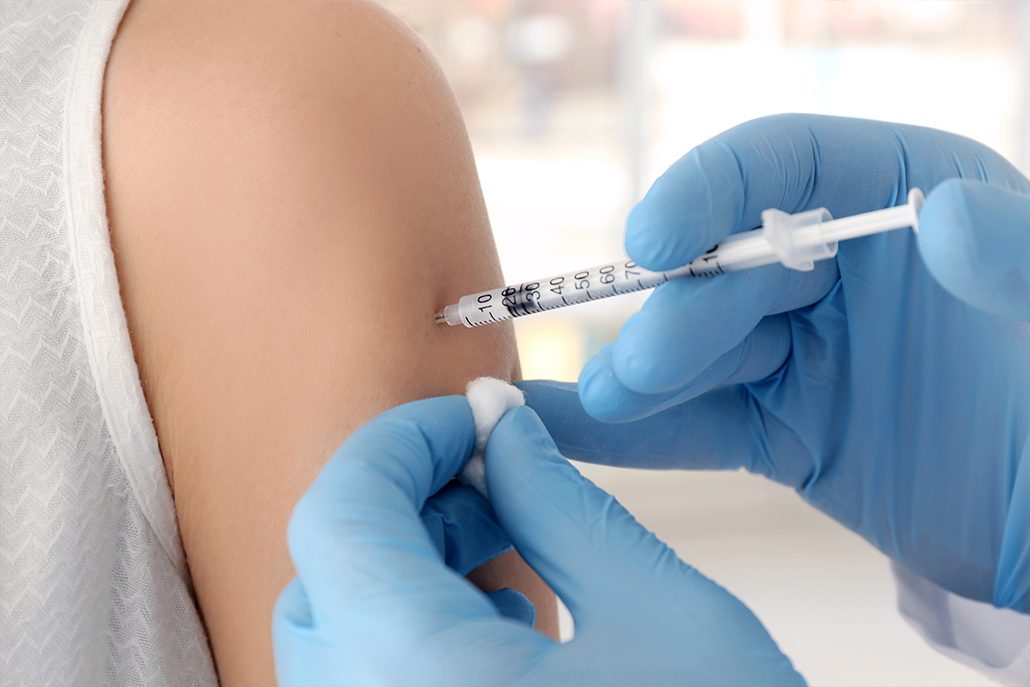How Do Allergy Shots Work?
What Are Allergy Shots?
Immunotherapy, more commonly referred to as allergy shots, are not a medication, but rather a more natural approach to increasing your tolerance to the allergens in which you are allergic. Once you have been allergy tested, our allergists may recommend allergy shots based on your diagnosis.
Are Allergy Shots Effective?
According to the National Institute of Health, 85% of people with allergic rhinitis (hay fever) will benefit from allergy shots within the first year, lessening their symptoms and need for medication. Additional research has shown that children on allergy shots are less likely to develop asthma. Insect venom immunotherapy is also highly effective treatment for stinging insect allergies.
How Do Allergy Shots Work?
Allergy shots work by injecting you with trace amounts of the allergens that are bothersome to you. By gradually increasing the doses of these allergens, you begin to develop immunity to them, and your body decreases its allergic reaction. Here is a video explaining the testing and immunotherapy process we show to patients after they are tested:
Reaching the Maintenance Phase:
Maintenance begins when the effective dosage is reached at the end of your ‘build-up’ phase. In the maintenance phase, your body begins to increase its tolerance. Patients transition to 1 shot/week for the next year and over time, the period between injections progressively increases. The recommended duration of immunotherapy is 3-5 years.
Build-Up Schedules:
Traditional Build: 1-3 shots/week (no appointment needed)
3-6 months to reach ‘maintenance’
Cluster Build: 2 appointments/week (approx. 2 hours each)
1-2 months to reach ‘maintenance’
RUSH: 1-2 full-day appointments
1-2 days to reach ‘maintenance’
For traditional allergy shots, no appointment is necessary. You simply stop by, scan in, and you’ll typically get your shot in less than 10 minutes. We do recommend that you stay 30 minutes after your shot to make sure you experience no adverse reactions.
Benefits of Allergy Shots
Over time, those on allergy shots can have their symptoms minimized or even eliminated. This means that patients may no longer experience allergy symptoms or asthma flares, nor have the need for medication or further allergy shots.
Investment
Research has shown that those on allergy shots ultimately save money by reducing their need for medicine, prescriptions, and visits to the doctor or hospital. For those without insurance or with high-deductible health plans, we gladly offer payment plans with 0% financing. Contact our billing department at 800.999.1249 to learn more.
Alternatives:
Allergy Tablets
The FDA has recently approved oral immunotherapy tablets for sale within the US. These tablets are fast-dissolving tablets that are placed under the tongue and contain specific pollen extracts. Oraliar contains extracts from five grass pollens, for example. The other tablets products contain just one extract per tablet (timothy grass and ragweed).
The concept is the same as allergy shots; build up a tolerance to bothersome allergens through consistent exposure. Family Allergy & Asthma’s Research Institute participated in the clinical trials of the grass tablets. In general, they are less effective than allergy shots. Allergy shots have an effectiveness of over 80%. Allergy tablets are in the range of 50-60% effective. Tablets are generally not the best option for patients who are allergic to multiple things.
Additional Information on the Tablets:
-Allergy tablets require a prescription, and it is required that a patient is allergy tested prior to being prescribed the tablet(s).
-Tablets have just recently been approved by the FDA and coverage by health insurance is not known at this time.
-The cost of the tablets will vary based on your insurance. At this time, we expect the cost to be comparable to allergy shots, but remember they cover only grass pollen allergy and do not affect other types of allergy.
Allergy Drops
Sublingual Immunotherapy is often referred to as allergy drops. The antigens used in allergy drops are the same ones that are used in allergy shots, they are just taken orally versus having them injected into the arm. Research has shown allergy drops to be less effective than allergy shots in the treatment of allergies and drops pose some additional challenges to patients who are allergic to multiple items.
Currently, allergy drops are NOT approved by the FDA, though their usage is fairly common and completely legal. The lack of FDA approval does mean that insurance will not cover allergy drops and patients will be responsible for the full cost. Even so, for some patients, allergy drops will still make sense, and we are glad to discuss the pros and cons of allergy drops so you can make an informed decision. Availability of allergy drops may vary by region and physician, please contact your local office if this is something you are interested in learning more about.




Leave a Reply
Want to join the discussion?Feel free to contribute!